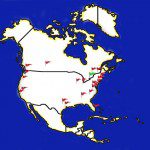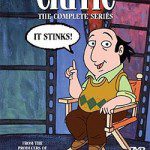Some Straight Talk on Vancouver’s Weekly Newspaper War
WestEnder publisher James Craig puts Georgia Straight publisher Dan McLeod on notice. We're the new alternative, says Craig. Nonsense, says McLeod. Our reporter keeps score

WestEnder publisher James Craig, in his W. Broadway office, presides over copies of his Vancouver weekly.
Aaron Leaf
James Craig, a balding middle-aged man in a blue sweater and thick, black-framed glasses, peers furtively through venetian blinds. He motions for me to come closer. “See that yellowish building?” He’s pointing down busy West Broadway in the trendy South Granville district just outside downtown Vancouver. “Right next to that is going to be their new offices.”
Craig is referring to the Georgia Straight, his former employer and the oldest and largest of Vancouver’s many weeklies. The irony that their headquarters will soon be within eyesight of his second-floor workplace is not lost on him.
Craig toiled at the Straight for over seven years, beginning in the mid-1990s and ending with his termination, which he won’t discuss, in 2002. He worked with Straight publisher Dan McLeod on sales and marketing strategies. Some of these, including the Best of Vancouver special section and the Golden Plate Awards, have become annual staples. Craig is now trying to replicate his success as the publisher of the WestEnder, Vancouver’s newest urban weekly.
Until recently, the WestEnder was a community newspaper that served Vancouver’s downtown. It covered neighbourhood politics and events, or, as Craig puts it, “stuff happening at City Hall and break-ins.” Over the last 10 years, however, it has been slowly evolving into something that resembles an alternative weekly.
Craig has accelerated this process in the the six months since he arrived. Along with the like-minded new editor Michael White, 80 per cent of the paper’s editorial has been transformed into a weekly alternative they hope will reflect the city as a whole. This includes beefed-up entertainment coverage, more in-depth feature articles and items such as the Matt Groening comic, Life in Hell, which used to be published in the Straight.
Laura Moore, responsible for arts advertising in the Straight, shrugs off questions about the WestEnder, boasting, “We’re Canada’s largest urban weekly.” She says her paper is even bigger than Toronto-based giant Now Magazine. “We’re an alternative weekly like the Village Voice.” The WestEnder, she sniffs, “is a community paper” that “belongs to an extensive community paper network.”
The Straight has a circulation of 125,000. According to Ipsos Reid, it has over 340,000 readers per week. In contrast, the WestEnder‘s circulation stands at 55,000, up 6,000 from last year. Craig says, “When you increase circulation by 10 per cent in one year, when other newspapers are decreasing circulation or holding, it means you’ve got a voice that people are finding interesting.”
But Moore says the Straight‘s circulation is also growing, something she attributes to the steady decline in readership numbers of Vancouver’s dailies. Print media in the city are dominated by CanWest Global Communications Corp., she says, and people are turning to the weeklies for diversity.
There is no lack of alternative sources. Vancouver’s smaller print outlets include the Straight, the WestEnder, The Asian Post and the on-again, off-again Only magazine as well as a large number of community and neighbourhood newspapers. The third most visible weekly, Terminal City, announced last week that it had stopped publishing.
One of the surprising successes is not a newspaper at all. TheTyee.ca is the brainchild of David Beers, former editor of Mother Jones and a contributor to, among other publications, Harper’s magazine. Beers’s site contains a mixture of original hard news reporting, arts coverage and political discussion, and includes numerous columns and blogs.
The Tyee, named for a type of salmon, started making waves last May during the British Columbia provincial election. It broke one of the largest stories of the campaign – allegations of improper fundraising on the part of the B.C. Liberal Party – which was picked up by numerous news outlets, including CBC.
According to statistics kept by the site, in October alone the Tyee received over 130,000 unique visitors who made 400,000 visits and looked at roughly one million pages.
Like Moore, Beers believes that the rise in alternative media consumption is a reaction against CanWest’s near monopoly of Vancouver newpapers. It owns both major dailies, the Vancouver Sun and The Province, the National Post as well as the city’s largest community paper, The Vancouver Courier. This is bad enough, according to Beers, but then CanWest also has an obvious “pro-business bias. People here are underserved in getting alternative viewpoints.” He believes the success of the Tyee stems from its ability to expose the corporate media slant.
Craig couldn’t agree more with Beers. For him, transforming the WestEnder into an alternative weekly means he gets to “uncover things the mainstream press won’t write about.” He wants his stories to reflect the issues “the mainstream press cannot write about because they’re tied in with politics and potential advertisers.”
Craig’s aspirations annoy Dan McLeod, the founder, owner and publisher of the Georgia Straight. On the telephone, the sixty-something McLeod sounds indignant. The WestEnder, he says, “is what I call a faux alternative.” He points out that its owner, Black Press, headed by David Black, has offered to buy the Straight numerous times. McLeod asks how the WestEnder can possibly represent an alternative viewpoint when it’s run by “a large media consortium, which is 20 per cent owned by Torstar?”
According to McLeod, Black is known to involve himself directly in the editorial decision-making process at his community papers, something MacLeod claims he doesn’t do at the Straight. Craig says Black Press has shown nothing but support for his changes, and insists that at the WestEnder he has real autonomy.
The WestEnder‘s recent changes are an attempt by Black Press, says McLeod, to “play a smoke and mirrors game. If they happen to produce some good journalism it’s entirely by accident.” He attributes any newfound success to the WestEnder’s “mimicking” of the Straight.
“There’s no question, it’s a slam dunk,” McLeod continues. “They’re using the business model we use.” Just look at the paper, he says. “They’ve even gone to the extent of copying our redesign.”
It is striking, the aggressive new visibility of the WestEnder around town, compared to just a year ago. People who have never read it before are now picking it up, including my own mother, a loyal Straight reader for the past 10 years. The similarities between the two papers, such as content and look, are archetypal of North American alternative weeklies, but there is one thing that seems a little too close to be an accident – the street boxes.
McLeod is especially angered by the WestEnder‘s boxes: their overall black colour, their white logo and their close proximity to the Straight‘s boxes. He says his boxes have been white on black for 25 years.
Peering out the venetian blinds at the enemy, Craig says senior personnel at the Straight are running scared. “They have an obsession with everything we’re doing,” he chuckles, even taking “steps to stop our advance.”
Craig won’t mention what steps exactly, except to hint that some of his writers have been approached to write for his former employer. Grinning with satisfaction, he says, “This tells me that it’s working.”













